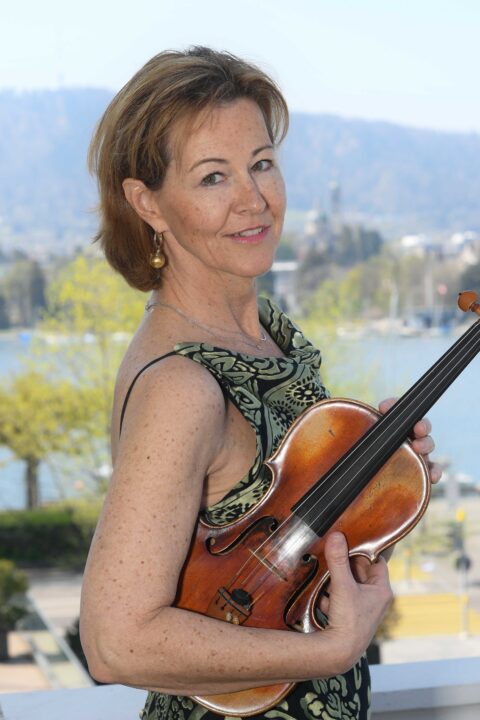– September 6, 2024 (Schweizer Musikzeitung)
At this year’s USDAM Delegates’ Meeting, violinist Birgit Thorgerd Müller was elected as a new member of the Central Committee. We introduce her here.
The answers to our questions about her motivation and life as an independent musician were sent to us in writing.
Birgit Thorgerd Müller grew up in Coburg (Bavaria) until she graduated from high school in 1988. Parallel to her schooling, she began violin lessons with Jacob Gilman in Munich in 1986, completed her regular studies with a concert diploma, and completed her training in Nora Chastain’s class in Winterthur. Further artistic impulses came from violin master classes with Aaron Rosand, Zhakar Bron and Grigori Zhislin, among others.
From 1993 to 1995, she played in the Stuttgart Radio Symphony Orchestra, before moving to Zurich for private reasons and starting a family there. Since moving to Switzerland, she has worked as a freelance/interim, mainly with the Zurich Opera Orchestra (Philharmonia Zürich), and is a regular extra with most orchestras in German-speaking Switzerland (Lucerne, St. Gallen, Winterthur, Basel, Bern), in neighboring countries (SWR Symphony Orchestra, Munich Philharmonic Orchestra, Bavarian Radio Orchestra) and, for example, with the Gstaad Festival Orchestra. Collaboration with Nikolaus Harnoncourt, Zubin Mehta, Bernard Haitink, Herbert Blomstedt, Teodor Currentzis, Daniele Gatti and Jaap van Zweden, among others, has provided and continues to provide her with invaluable inspiration, enabling her to pursue her passion as an orchestral musician.
She also devotes herself to solo and chamber music concerts, and pays particular attention to national and world premieres of works by contemporary composers. Gerhard Deutschmann, Andreas Willscher and Vahram Babajan have already dedicated works to her.
Birgit Thorgerd Müller, what motivates you to work on the Central Committee?
Although it’s not primarily related to the committee’s work, I’m very keen to raise awareness of the importance of music for the mental health of our society. This is totally independent of whether you play music yourself or are “just” a consumer.
On this subject, here’s a little anecdote from a trip we made this summer to Nové Město nad Metují, in the Czech Republic: in the courtyard of the town’s castle, the owner had installed a piano, with the explicit mention that you were welcome to play it, as long as you knew how to play at least a little. During our short stopover, cell phones were put away and conversations about music or totally different themes began between people who didn’t know each other, between piano players and listeners. The mood had noticeably changed. In my opinion, music speaks a language in all of us that unites and pacifies. In my opinion, we could make much greater use of this positive effect.
What motivates me to participate in the USDAM Central Committee comes from a deep desire to actively represent and strengthen the interests and concerns of my colleagues. This suits me well, as I enjoy creating links between individuals and groups. I’d like to use this ability to promote cohesion within our community and advance common goals.
Adequate remuneration for musicians is also a particular concern for me. I firmly believe that the valuable work we do must be fairly and appropriately remunerated. I want to work hard to ensure that the framework conditions for music production in Switzerland continue to improve.
I’d like to work within the committee to ensure that our voice is heard even more in the cultural discourse, and that we act, as an association, in a sustainable and forward-looking way.
What’s your day-to-day life like as a freelancer?
I have personally experienced both permanent membership and independent life. In the metropolitan areas, Switzerland offers a dynamic cultural diversity that is in great need of musicians. Culture is supported, so a large number of projects can come to fruition. The classical scene is relatively simple, so most people know each other, and freelancers can help each other out. Ideally, daily life is musically varied, thanks to the flexibility. Alongside these very rewarding aspects, there are of course financial and logistical constraints: you’re not always in demand with the same regularity, and projects aren’t always as well paid.
What more can USDAM do to support the self-employed?
USDAM already offers a wide range of support options. From legal aid to the relief fund, to the ongoing negotiations for a minimum wage, for example. In my opinion, stronger networking between the self-employed would be desirable and welcome, as would specific training courses or workshops. There could be even more impetus for this from USDAM. From my own experience, however, I also know that the permanent professional flexibility required often makes it difficult for self-employed people to plan long-term activities outside work. At USDAM, we keep our ears open and try to reach out to freelancers and strengthen the group feeling, with the aim of giving greater social and political weight to the voice of independent musicians.

Birgit Thorgerd Müller (Photo: André Springer)

